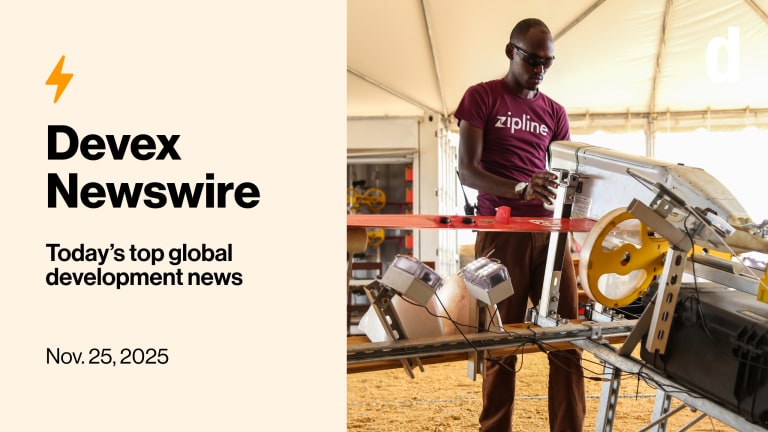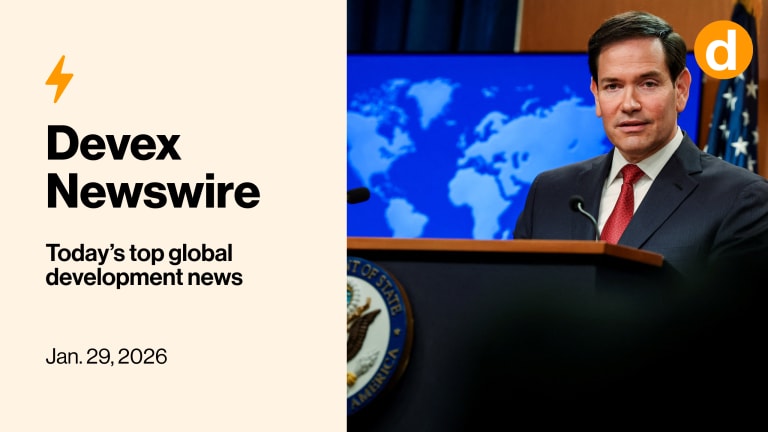
Not only is the U.S. State Department being forced to take on the job that USAID once did, but it may also be expected to do so with fewer jobs of its own.
Also in today’s edition: The Financing for Development conference comes to a close, but the work is far from over.
Don’t miss this event: On Monday, July 7, at 9:30 a.m. ET (3:30 p.m. CET), we’ll be having an exclusive conversation with Patricia Malila Pinheiro, the director of programs at the Segal Family Foundation, to learn how fundraisers can connect with the U.S.-based foundation. Register here.
State of suspension
USAID was stripped to the bone, with a skeletal crew left behind at the State Department to manage the transition. While the State Department isn’t nearly in the same predicament, its own workforce is now facing potentially deep cuts as well — reportedly 2,000 of them.
That includes roughly 700 foreign service officers who could be fired by sheer virtue of the fact that their rotating assignment happens to currently be in the United States and not abroad.
“That’s 700 fewer people who are out there in the world making the case for Americans, for American businesses, and for our interests. And what’s kind of most mind-blowing to me is that these are individuals who are nonpartisan, who have worked under both Republican and Democratic administrations, and want to work under whoever is the president, because they understand that … what’s in America’s interest is bipartisan,” Brian Volsky of Foreign Policy for America tells me.
That’s not how the administration sees it. President Donald Trump has frequently derided America’s foreign aid agencies as woke left-wing enemies out to undermine him.
Enemy or ally, there will likely be fewer of them at the State Department, unless the conservative-led Supreme Court intervenes or the Republican-led Congress defies Trump’s wishes to downsize the department.
In the meantime, emotions are no doubt running high inside the department.
“There’s all sorts of cable traffic within the State Department from panicked ambassadors pointing out that they can’t manage all of this stuff,” James Kunder, acting USAID acting deputy administrator, said during a recent Devex Pro briefing.
“I would hope that the Trump administration has a plan to address what will be the sunken morale for those people who are expected to do more with less,” Volsky adds.
Read: State Department employees in anxious limbo over massive staff cuts
ICYMI: State Dept takeover of USAID is an ‘impending trainwreck,’ experts say (Pro)
Not yet a Devex Pro member? Start your 15-day free trial today to experience an unrivaled analysis of the development sector with expert insights, funding analyses, timely career resources, and our latest Pro offering — a special Saturday edition of the Pro Insider newsletter tackling some of the biggest questions about the future of U.S. foreign aid, led by Senior Reporter Michael Igoe — and get the latest edition directly in your inbox tomorrow!
Harsh words
U.S. Secretary of State Marco Rubio was once seen as an advocate of foreign assistance. Now his critics see him as the wrecking ball that tore down America’s aid apparatus. Rubio, of course, sees it quite differently.
In a sharply worded Substack post, he rips into USAID, writing that “beyond creating a globe-spanning NGO industrial complex at taxpayer expense, USAID has little to show since the end of the Cold War.”
“Development objectives have rarely been met, instability has often worsened, and anti-American sentiment has only grown,” he argues, noting that “the countries that benefit the most from our generosity usually fail to reciprocate.”
That’s why he advocates for a new aid approach: “Moving forward, our assistance will be targeted and time limited. We will favor those nations that have demonstrated both the ability and willingness to help themselves and will target our resources to areas where they can have a multiplier effect and catalyze durable private sector, including American companies, and global investment.”
Background: What part is Marco Rubio actually playing in USAID's dismantling?
The end is only the beginning
That’s a wrap on the Fourth International Conference on Financing for Development, or FfD4. Well, sort of — stay tuned for our special FfD4 newsletter on Monday with even more insider deets.
As is always the case with these types of global gatherings, the real action takes place once the meetings and mingling stop and everyone goes back home to, hopefully, follow through on their promises.
Another common thread? People go home with mixed feelings. Where some see unmitigated success, others see abject failure. But at Sevilla, most of the attendees and speakers that my colleagues Jesse Chase-Lubitz and Elissa Miolene talked to landed somewhere in the middle.
“Opportunities exist,” says Pradeep Kurukulasuriya, the executive secretary of the United Nations Capital Development Fund, which helps least developed countries grow their economies by providing guarantees or grants to help de-risk and attract private investment. “The conversations we’re having [in Sevilla] gives me hope that we can change the times, that we are in fact changing the times.”
The times are certainly changing — in large part fueled by the retrenchment of the United States, which is leading to a revival of sorts for multilateralism.
American economist Joseph Stiglitz says the language in the Compromiso de Sevilla and the plans put in action for countries to establish a U.N. tax framework “points to the possibility of this new multilateralism” — and that because the U.S. walked out, “the coalition of the willing can move forward.”
Read: Reporter’s notebook Day 4 — ‘Sevilla is about what comes next’
+ Listen: For the latest episode of our podcast series, Elissa and Jesse join Associate Editor Thomas Cserep live from Sevilla to discuss some of the key takeaways from FfD4.
Cities on a hot streak
In a way, you could say that cities have become “the coalition of the willing” when it comes to climate change. National governments and international institutions have been far less willing to devote real money to curbing greenhouse gas emissions.
“Cities are delivering,” said Luis Sáenz, senior advocacy manager for the C40–GCoM Joint Programme, a global climate-focused network of nearly 100 mayors around the world.
But the global financial architecture isn’t delivering, Sáenz said during an interview at Casa Devex on the sidelines of FfD4.
Urban areas account for roughly 70% of global carbon dioxide emissions and produce around 80% of gross domestic product. As the world becomes more urbanized, cities’ role in meeting climate goals is only growing — but they still face barriers in securing funding, my colleague Ayenat Mersie writes.
A key obstacle is how national fiscal systems are structured. Many were set up decades ago and haven’t kept pace with rapid urban growth. Cities often have limited powers to raise their own revenue or borrow responsibly, leaving them reliant on transfers from national governments that can be unpredictable or come with restrictions.
“Those relationships between the national and the local are not necessarily suited for those challenges that cities are facing right now, in terms of how cities are planned … how they raise their own resources ... and if they're able to borrow money,” Sáenz explained.
This is not just a technical problem — it has real consequences for climate goals. Without reliable financing, cities can’t fund green infrastructure, adaptation projects, or social programs needed to build resilience.
“Roughly 4% to 5%, 6% of municipalities across the world are allowed to borrow, which means nothing, right?” Sáenz said. “Only a tiny group of cities are what we call credit worthy, meaning that they can go to the capital market, or even to the MDBs, to ask and receive a loan.”
Read: Cities are ready to act on climate — but financing remains out of reach
+ Explore all our FfD4 coverage and programming.
A more perfect union
What if you could become a donor powerhouse without spending an extra dime?
Samy Ahmar, head of global health at Save the Children, and Willy Bergogné, director of Save the Children Europe, argue that the European Union could, “without spending a cent more, become the world’s undisputed superpower in the promotion of international solidarity, poverty alleviation, and global health.”
How? By coming together, literally.
“Turning 28 [EU member state] aid budgets into one would create huge efficiencies and ensure much more funding goes directly to those who need it the most,” they write in a Devex opinion piece. “It would help generate the sort of economies of scale that have helped USAID become so dominant, through its ability to disburse very large and system-changing grants, something no EU aid budget is currently able to do. It would save money to the public purse of every single EU member state, at no political cost.”
“The European Union has virtually nothing to lose, and everything to gain,” they add, “from pooling aid budgets into a single, ‘federal’ instrument of global influence.”
Opinion: The EU is an aid superpower. It just doesn’t know it yet
In other news
BRICS plans to establish a New Development Bank-backed guarantee fund by the end of 2025, aimed at reducing financing costs and attracting significant private investment for sustainable development projects to member countries. [Reuters]
The Inter-American Court of Human Rights has released an advisory opinion stating that its 20 member states in Latin America and the Caribbean have legal responsibilities to protect the human right to a stable climate. [The Guardian]
COP30 President André Corrêa do Lago has downplayed the Brazilian government’s move to expand the country’s oil production, saying that reaching net-zero carbon emissions entails “some years continuing to use oil.” [Financial Times]
Sign up to Newswire for an inside look at the biggest stories in global development.
Search for articles
Most Read
- 1
- 2
- 3
- 4
- 5








